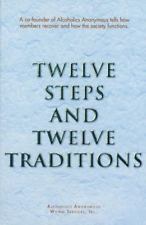
"Alcoholics Anonymous should remain forever nonprofessional, but our service centers may employ special workers."

 |
Tradition Eight "Alcoholics Anonymous should remain forever nonprofessional, but our service centers may employ special workers." |
 |
A far longer discussion follows on the matter of payment for valuable services other than Twelfth Step work. Caretakers, secretaries and others working in A.A. clubs and those using personal knowledge of alcoholism in a private capacity in the workplace or in related health fields were criticized for profiting from the fellowship. Bill and Dr. Bob themselves were accused of making money from A.A. at one point. (See Pass It On, Page 256-257)The author writes, "[W]hen we had declared that our Fellowship couldnít hire service workers nor could any A.A. member carry our knowledge into other fields, we were taking the counsel of fear, fear which today has been largely dispelled in the light of experience." (Page 167)
Those hired to work in A.A. clubs, and especially at the New York office perform necessary services and help make Twelfth Step work possible, but do not actually perform such work in their paid capacity. We have seen in Step Twelve (Twelve and Twelve, Page 110), that some activities at meetings such as speaking, making coffee and the like also make Twelfth Step work possible. However, requirements of time, dedication and certain skills used outside of meetings often require special workers. "Volunteer committeemen and assistants could be of great help, but they could not be expected to carry this load day in and day out... So we hire A.A. staff members. We pay them well, and they earn what they get. They are professional secretaries, but they certainly are not professional A.A.ís." (Page 169)
Those who use knowledge of alcoholism in a professional capacity, either in education, social work, medicine or business, similarly do not professionalize the Twelfth Step. This issue also arose in Tradition Six. (Page 158) So long as such people do not use the A.A. name for publicity, fundraising or lobbying purposes, and thus break the Tradition of Anonymity, there is no violation of our principles. "We cannot declare A.A. such a closed corporation that we keep our knowledge and experience top secret. If an A.A. member acting as a citizen can become a better researcher, educator, personnel officer, then why not?" (Page 171)
The conclusion based on A.A. experience is: "This is the exciting welter of events which has finally cast up A.A.ís Tradition of nonprofessionalism. Our Twelfth Step is never to be paid for, but those who labor in service for us are worthy of their hire." (Page 171)